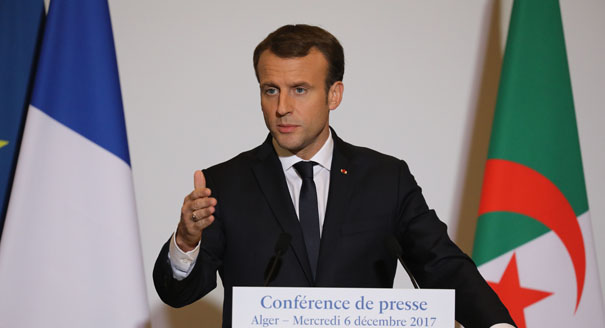On December 6, French President Emmanuel Macron arrived in Algeria for a “work and friendship visit,” as the Elysée Palace described it, insisting it was not an official visit. During his twelve-hour stay, Macron visited the Martyrs Memorial, went on a walkabout in the heart of Algiers, met with President Abdelaziz Bouteflika and Prime Minister Ahmed Ouyahia, and had a working dinner with the president of the Council of the Nation, Algeria’s upper house, Abdelkader Bensalah.
Macron was the first French president to visit Algeria who was not from a generation that experienced the era of French colonialism in the country. The 39-year-old Macron, like all other French presidents before him, arrived having to manage a burdensome past between the two countries, which are still struggling with the memory of that time. Many Algerians wondered whether Macron would be faithful to what he had said on the campaign trail, when he had described French colonialism as a “crime against humanity.” At the time his remarks had provoked outrage in France, losing him three points in the opinion polls, and he was forced to apologize as a consequence.
During his visit, Macron made a symbolic gesture by promising to return the skulls of Algerian resistance fighters killed by the French in the 1850s and currently exposed in the Musée de l’Homme in Paris. But this time, he did not use the controversial expression he did during his campaign. Nor did he issue official apologies to the Algerians. Instead, he insisted on “building a new relationship” and “turning the page.” He also called on young Algerians “not to be prisoners of a past that they did not even know,” and to “ask themselves how to build a future relationship [with France].” According to Macron, Franco-Algerian relations can be enhanced by forging new economic ties and boosting investment in renewable energies, innovation, the digital economy, the automotive industry, and pharmaceuticals, among other sectors.
France is seeking to boost its investments in Algeria, a country of 41 million people, which represents half the population of the Maghreb and is strategically located near Europe. However, Algeria also extends geographically into parts of West Africa, which represents a market of some 330 million people. Furthermore, it seeks to diversify its economy and is more open to investment than before. With the minimum monthly wage at $170, Algeria is also a place with attractive labor costs for investors.
In 2013, France lost its position as primary trading partner with Algeria to China. However, a year later, it had become Algeria’s second largest trading partner, ahead of Italy but still behind China, with 10.9 percent of market share. Outside the hydrocarbons sector, France remains the top foreign employer in the country—with French companies hiring 40,000 people directly, and nearly 100,000 people indirectly—and the leading investor in Algeria, with approximately 500 French companies installed in the country.
Among these French companies is the car and motorcycle manufacturer Peugeot Citroen PSA, which recently announced a €100 million investment to build a factory in Oran with three Algerian companies. This joint-venture, created as part of the France-Algeria Joint Economic Committee, a mechanism for the consolidation and diversification of commercial, industrial, and trade relations between the two countries, is expected to create 1,000 new jobs and produce 75,000 cars annually. Most importantly it will allow Peugeot Citroen PSA to complete its goal of selling 700,000 vehicles in the Middle East and North Africa by the year 2021.
Additional partnership agreements were signed on December 7, after Macron’s return from Algeria, during a meeting in Paris of the Algerian-French Intergovernmental Committee. Among these was an agreement to produce cable cars in Algeria by the French Pomagalski company, a cooperation agreement between the Algerian National Institute of Intellectual Property and the French Standardization Association, and a third agreement creating a digital hub in the health sector between the Universities of Tlemcen and Rennes.
A major aim of such efforts is to engage in collaborative production as a win-win strategy for both sides. The case of FragorBrandt is a good example. The French home equipment company was on the verge of bankruptcy when it was taken over by the Algerian group Cevital. This saved some 500 jobs in the French production sites of Saint-Jean de la Ruelle and Vendôme, while also maintaining the company’s 1,200 posts in Algeria. The initiative is expected to create 7,500 new jobs by the end of 2018 as well.
France needs Algeria in the economic sector, but also when it comes to security. The country is a pivotal actor in the “fight against terror” in the Maghreb-Sahel region. Algiers has uncontested mediation capacities as well as strong links that have allowed it to help neighboring countries, such as Tunisia, Libya, and Mali. This is essential for France, and it is Algeria that sponsored negotiations between the Malian government and armed groups that culminated in 2015 in a peace agreement.
It is also Algiers that assisted France during Operation Serval to fight armed militants and expel them from northern Mali. It did so by opening its airspace to French military aircraft and providing them with fuel free of charge. Today more than ever, France needs Algerian assistance in the fight against violent extremism, armed militancy, organized crime, and illegal immigration in the Sahel. Algeria is the only actor with real military capacities and experience in the region to help in those regards.
Economic and security cooperation between Algeria and France is crucial. Yet, when it comes to history, an official apology for the period of French colonization and for the abuses against Algerians must be issued. Unless this is done, that memory is more likely to remain a significant obstacle to future relations between the two countries.






